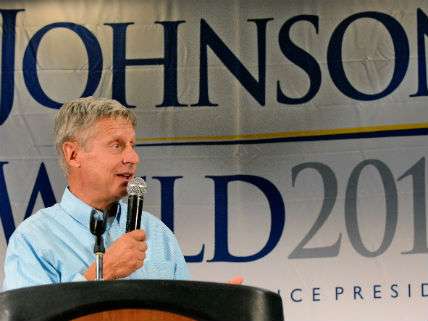Gary Johnson on Climate Change and a Carbon Tax
Is a carbon tax a 'very libertarian proposal' for handling man-made global warming?

First, my claim is anything that you may think of as an environmental problem is the result of a defect in property rights. Basically, environmental problems occur in open-access commons where the incentive is to plunder a resource before anyone else can beat you to it. This includes unowned fisheries, wild game, rivers, estauries, forests, and the atmosphere. There are two ways to handle problems of overuse and abuse in open access commons: Recognize or assign property rights to the resource or regulate the resource. Some resources are more easily enclosed than others, e.g., fisheries, rivers, and forests.
It is arguably much more difficult to assign property rights to the global atmosphere. As a consequence, the nations of the world agreed in 1987 to regulate and ban the substances that where eroding the stratospheric ozone layer that protects the earth's surface from dangerous UV sunlight.
So what about climate change? It is a fact that all temperature data sets agree that the globe was been warming in recent decades ranging from a low rate of 0.12 to a higher rate of 0.17 degrees Celsius per decade. In addition, all data sets agree that this past July was the hottest month ever recorded. For a review of the debate over man-made climate change, see my article, "What Evidence Would Persuade You that Man-Made Climate Change Is Real?", as well as refutations of my arguments.
In any case, Libertarian presidential candidate Gary Johnson agrees with me that man-made climate change is happening. Furthermore, Johnson in a CNBC interview also suggested that a carbon tax might be a "very libertarian proposal" to address the open access commons problem of climate change. Johnson is tentative, saying that he is "open" to considering a carbon tax. He specifically notes that a carbon tax would be a simple comprehensive way to replace all sorts of clunky expensive top-down centralized regulations and subsidies that aim to limit carbon dioxide emissions. Johnson's thinking that a carbon tax might be a useful way to handle the open access problem of climate change is in line with that of some groups who are part of the larger free market intellectual movement.
I discuss the pros and cons of a carbon tax in my article, "Can a Carbon Tax Solve Man-Made Global Warming?" Over at Scientific American I explore how speeding up economic growth can solve climate change. I argue:
[F]aster economic growth provides the wherewithal to spur innovation and create cheaper and more efficient technologies. Swanson's Law is an example of increasing economies of scale: Every time global solar panel production capacity doubles, the price drops 20 percent. At the current rate of growth, electricity from solar panels will be cheaper than that produced by burning natural gas in less than a decade. Similarly, climate scientist James Hansen and his colleagues have urgently argued that there is "no credible path to climate stabilization that does not include a substantial role for nuclear power." A recent study published in PLoS ONE by Swedish and Australian researchers estimates that replacing all fossil fuel energy generation with nuclear power could be done in 25 to 34 years. Economic growth supplies the capital needed to fund the global no-carbon energy transformation, not mandates to deploy current, expensive, clunky versions of renewable energy and nuclear technologies.
A Johnson/Weld administration is far more likely than either a Trump or Clinton adminstration to adopt just the sort of free market policies that would speed up economic growth and technological progress. As a second-best proposal for handling the open access commons problem of climate change, a revenue neutral carbon tax makes considerably more sense than the current mess of federal and state regulations and subsidies and taxes.


Show Comments (263)